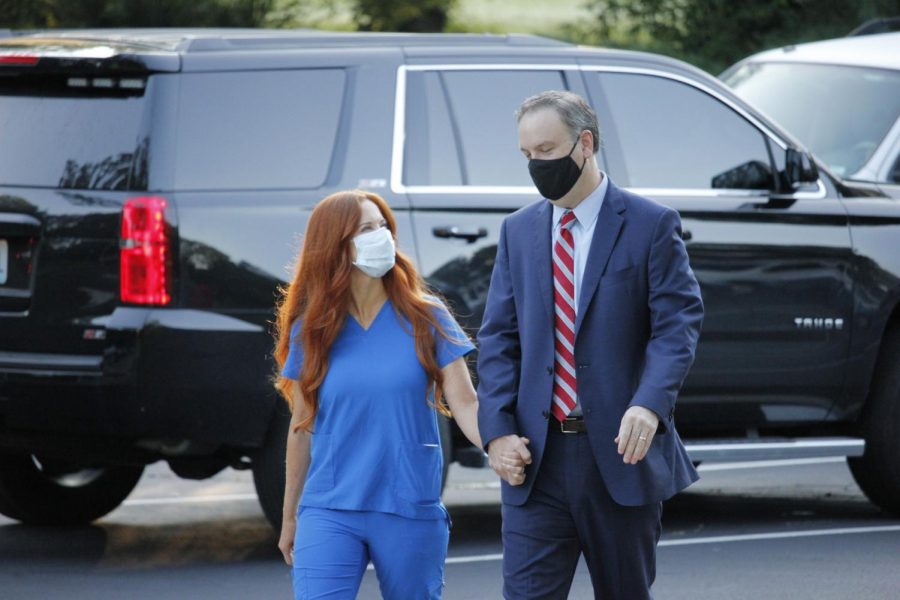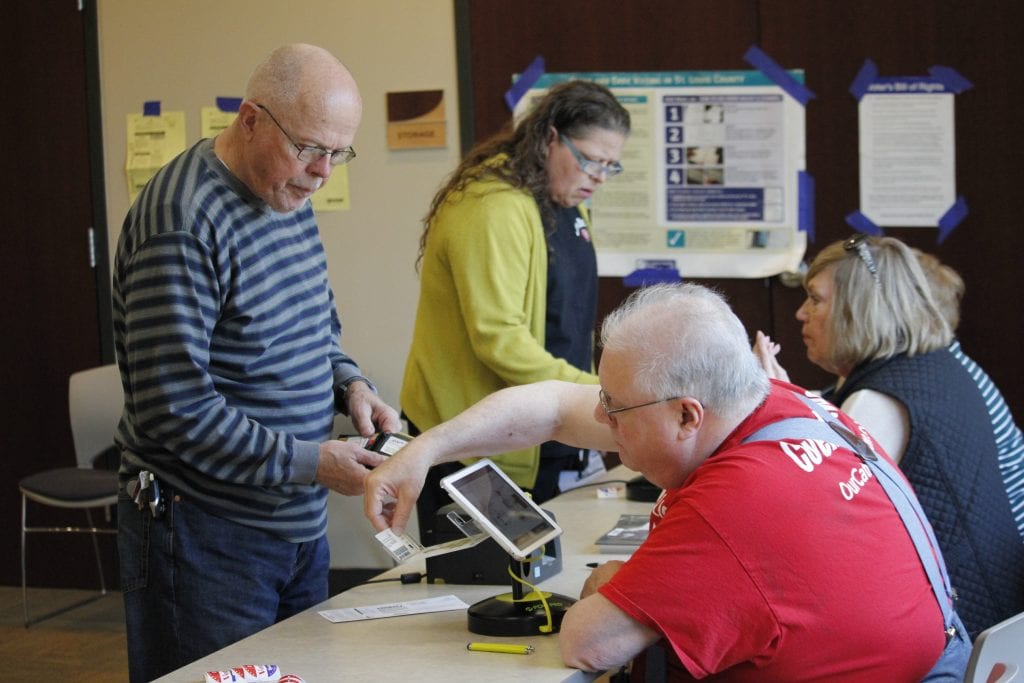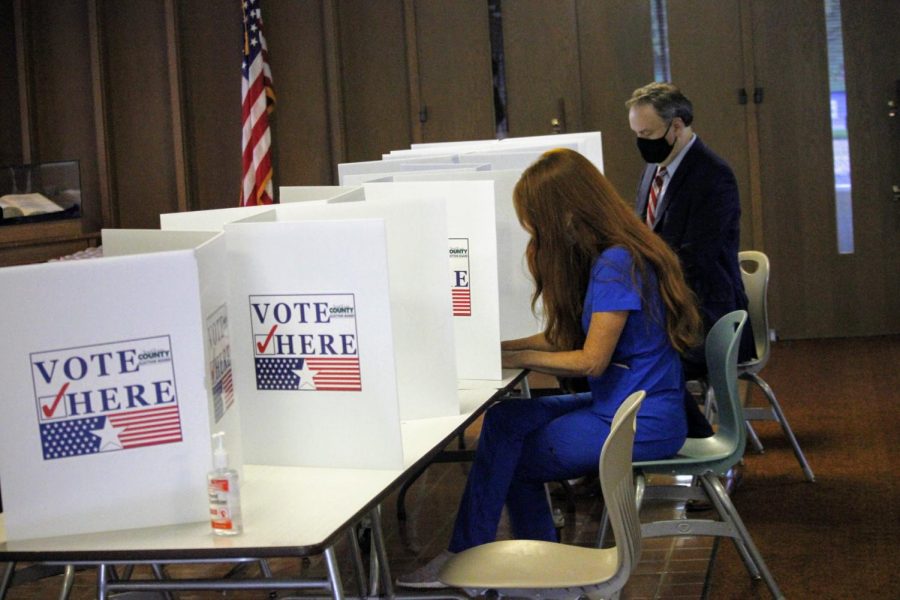Representing the state of Missouri, Attorney General Eric Schmitt filed a lawsuit Tuesday challenging St. Louis County’s ongoing public-health mandates related to the COVID-19 pandemic.
The lawsuit, filed Tuesday morning in St. Louis County Circuit Court by Schmitt’s office against the St. Louis County Department of Public Health and health director Dr. Faisal Khan and County Executive Sam Page in their official capacities, questions the constitutionality of the pandemic-related restrictions in St. Louis County, which include a mask mandate, restrictions on gatherings and masks in K-12 education. Since churches and places of worship are restricted under the order like any other business, attorneys for the state cite the U.S. Supreme Court’s April ruling against California Gov. Gavin Newsom and restrictions that specifically target religious gatherings instead of secular ones. Schmitt claims in the lawsuit that St. Louis County’s restrictions are at least as restrictive as the ones thrown out in California, and that they unfairly target churches when they do not restrict gatherings at hospitals or schools.
Schmitt, a Republican, sent a letter last month to Page, a Democrat, threatening to file a lawsuit against the “extreme restrictions” unless the county explained why its COVID-19 orders were still in place even as all Missourians became eligible for COVID-19 vaccines. Last week, Page announced alongside St. Louis Mayor Tishaura Jones that capacity for businesses would return to 100 percent for the first time since March 2020, the start of the pandemic, up from the 50-percent limit that had been in effect for weeks. The lawsuit claims that the “Reopen STL” revised order issued by Page and Jones was rushed in response to Schmitt’s letter, but still keeps what the state classifies as draconian restrictions on the personal freedom of St. Louis Countians that have continued for more than a year, such as requiring government approval before large private events, enforcing social distancing and masking for church services and requiring masks in K-12 education.
“From requiring a mask outdoors to subjecting citizens to government pre-approval for private events, enough is enough. The seemingly unending control over people’s lives must end,” Schmitt said in a statement. “Vaccines are widely available to all adults – it’s past time for St. Louis County to lift these restrictions, and that’s why I filed suit today.”
The suit alleges eight ways that the state believes St. Louis County has violated various state and federal laws – two counts related to religious freedom, one count alleging violation of freedom of assembly for requiring government preapproval for events, one count alleging that the latest public-health order is illegally vague under the Missouri Constitution and should be declared void, and four counts alleging St. Louis County’s order is arbitrary and capricious for failing to give meaningful consideration to negative impacts of the order, failing to consider less restrictive alternatives, failing to provide criteria for lifting restrictions and for the “broadly unreasonable substantive restrictions.”
Schmitt wrote in the filing, “The loss of personal freedoms, even for a limited time, constitutes per se irreparable injury … on the citizens and residents of St. Louis County.”
But a spokesman for Page pointed to Schmitt’s electoral ambitions as a reason for the lawsuit. Schmitt, who won election as attorney general in November after being appointed to the post in 2019, lives in Glendale in St. Louis County and served as a Missouri senator in the 15th District that represents Sunset Hills, Fenton and West County for eight years before being elected as Missouri treasurer in 2017 and then appointed as attorney general following the election of then-Attorney General Josh Hawley to the U.S. Senate. Schmitt has been mentioned as a possible candidate in the GOP scramble to succeed U.S. Sen. Roy Blunt, R-Missouri, who is retiring and will not be running for re-election in November 2022. Former Gov. Eric Greitens has already announced his candidacy for that GOP primary.
“We all know Mr. Schmitt is trying to increase his profile statewide and suing those protecting the health and safety of residents is apparently one of the ways he has chosen to do that. Our focus is on getting people vaccinated and on economic recovery,” county Communications Director Doug Moore said in a statement. “Litigation around public health orders across the country is nothing new and St. Louis County has been successful in defending every legal challenge around public health orders. Our legal foundation is sound.”
Although business capacity in St. Louis County is back up to 100 percent as of last week and bars and restaurants can stay open until 3 a.m., the new order still requires social distancing inside businesses, which restricts most small businesses’ capacity below the 100-percent threshold. A mask mandate is also still in place after the county set that requirement in July, with masks required for public spaces and outdoor events. Schmitt said his 10-page letter to Khan asked for evidence and justification for the orders, and he came away unsatisfied with County Counselor Beth Orwick’s four-page response letter.
Missouri has never had a statewide mask mandate at any time during the pandemic and has had few statewide orders related to COVID-19 since late May 2020, when Gov. Mike Parson said the state was back open for business. St. Louis County, the largest county in the state, has instituted more measures against the COVID-19 pandemic than any other county.
Page, an anesthesiologist, has said that the stricter measures are required in St. Louis County because the county had the first cases in Missouri and then has generally seen higher case counts and community spread than other areas of the state. The county executive has often pointed to hospitalization numbers as justification for his public-health orders. The seven-day moving average of COVID-19 hospitalizations released Monday by the St. Louis Metropolitan Pandemic Task Force showed an increase in hospitalizations to 214 from 212 the day before. The seven-day moving average of hospital admissions went down to 32 from 33 on Sunday.
St. Louis County initially instituted a stay-at-home order that lasted two months, before moving to opening businesses with lower capacity and masks. The latest “Safer at Home” order, the sixth major version, gives the appearance that only events above 500 people need preapproval from the health department, but the language is so vague that it’s difficult to tell, the lawsuit alleges.
The state strongly objected to the continuing K-12 mask mandate for schools both public and private in the lawsuit, stating that “to continue this sweeping mask mandate for K-12 educational activities is arbitrary, capricious, irrational, and unlawful, in light of the universal availability of vaccines for educational staff, the adverse impact on education, and the low risk of transmission in educational settings.”
St. Louis County, Page and the health department have been sued several times over his public-health mandates, but so far the county has won every case as judges have agreed that county officials have broad powers to close businesses during a pandemic. A judge agreed that the county could close certain businesses like gyms, and Page won that case when it was moved to federal court. A lawsuit filed by members of a church who could not gather in person had their federal lawsuit thrown out on procedural grounds. Business owners also lost another lawsuit challenging the constitutionality of the stay-at-home order.
When Page instituted an indoor dining ban Nov. 17 due to a surge in COVID patients at area hospitals, the Missouri Restaurant Association and local restaurants sued but lost the case at both the circuit and appellate court.
Read the lawsuit below:
